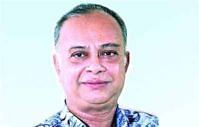Zaglul, my friend

IT would have been easier to write about Zaglul Ahmed if I had worked with him as a professional journalist. I could write about his expertise on diplomatic issues, his interest in the politics of the nation, his knowledge about South Asian issues and so on. Others can, and will, write more competently about these matters.
I was just a friend of his, just one of many friends he had, but still a special friend, I like to think. And I am sure that hundreds of others who were friends of Zaglul think of themselves as special friends of his. That was his especial quality: the ability to lavish friendship on whoever he came in contact with. I don't know if he ever read Dale Carnegie but he was Dale Carnegie incarnate; he had the gift of making friends effortlessly, without ever trying to influence them. The last time I met Zaglul was at a wedding reception on November 21, about a week before he died. With a smile on his face, he was flitting from table to table, hugging a friend here, shaking hands with another, always on the move, always smiling. I don't know if he ever had the time to eat on such occasions.
When I finally managed to say hello to him, he smiled, patted me on the shoulder in that characteristic way that was typically Zaglul's, and said he had just spent a month with his daughter Antara (tomader meye) in the US and was back with his wife (tomar bone). His wife Tazeen was a year junior to me in the English Department of Dhaka University, and his daughter Antara was a student of mine in the same department and had graduated some years back. I myself have known Zaglul for 47 years since 1967 when we were university students, more intimately during the last twenty years when common circles of friends began to coalesce and new bonds and associations were forged.
Many of his friends expected to see him again on November 29, on the night he died so suddenly, so tragically, so gruesomely. We were at Mujahidul Islam Selim's son's wedding reception and many of us were waiting for him to turn up. He was planning to finish a talk show and then come to the reception. But he had a rendezvous with death and we never saw him and will never see him again. Around 10pm that night, when I returned from the reception, a friend called and simply said that Zaglul had died in an accident. At 11pm I went to the morgue and met other friends of his who were with him earlier in the evening, now speechless with shock. We didn't want to see his dead body. We simply wanted to remember his smile, his bonhomie, his kindness and generosity, his infectious sense of camaraderie and his humour.
I have seen many posts on social media and heard people on talk shows wondering about how and why such a senior journalist like Zaglul would be riding a bus. Most people of his personal, social and professional stature would not, literally, be caught dead riding a bus. Zaglul did, and died riding a bus. But this I think points to another special gift that he possessed: the gift of humility. While he always praised others for whatever qualities they might, or might not, possess, he himself remained modest and self-effacing. That gift of humility, where the personal ego is almost negated, I think made it possible for him to move up and down the very fluid social and political ladder of Bangladesh with the utmost ease and comfort. He knew presidents and prime ministers, he knew all former ministers and current ones, he knew all politicians of all parties, businessmen, he knew most VIPs -- and he knew ordinary people as well who were his friends. He could hop on to a bus with the same ease as he could step inside a minister's Pajero.
I remember once asking Zaglul about the identity of an occasional columnist of this newspaper who wrote under a pseudonym. I was sure Zaglul knew because he knew everyone. I admired his columns and wanted to know who he was. Zaglul smiled and would not answer, as did the editor of the newspaper. I respected their circumspection and did not insist. A few months later, at a reception, he introduced me to a former ambassador and said: “Shawkat, this is the Megasthenes you wanted to know about.” I remain grateful to Zaglul for the introduction as I remain grateful to him for the hundreds of little kindnesses that I remember. When I met Megasthenes at Zaglul's janaza last Monday, we hugged for we knew that both of us, and hundreds more, had lost a great friend. Megasthenes said that I should write about him, and I told him that he should too.
About two years back Zaglul and I had made a deal in the company of a few friends, half-seriously, but I was deadly serious. The deal was that I would write about him if he were to die first, and he would write about me if I passed away earlier. The commitment was made and I was guaranteed an obituary. I was sure that he would have hundreds to write about him.
I have kept my part of the bargain my friend, however inadequate it is. Wherever you are Zaglul (rest in peace), and know that your friends will always remember your laughter, your kindness, your humour and your friendship for as long as they live.
The writer teaches English Literature at the University of Asia Pacific.

 For all latest news, follow The Daily Star's Google News channel.
For all latest news, follow The Daily Star's Google News channel. 



Comments